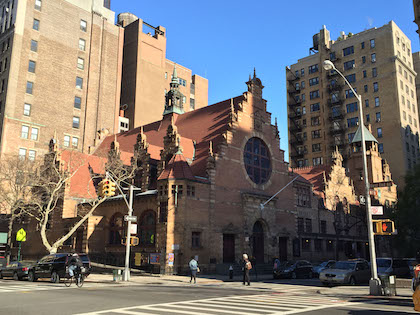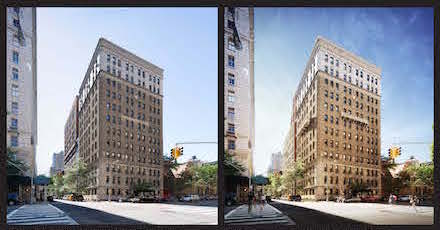
BY JACKSON CHEN | An Upper West Side church’s plans to create a 66-unit residential complex on West End Avenue was met with approval from the Community Board 7, who considered the project “reasonably appropriate.”
The West End Collegiate Church’s plans to construct an 18-story building would combine the property at 378 West End Avenue with a structure to be built on 260 West 78th Street. Both of the buildings are currently home to classrooms and facilities for the Collegiate School.
The plan approved makes no specific provision for affordable housing.
To facilitate the new combined building, the church plans to demolish the current existing structure at 260 West 78th Street, which the school now calls Platten Hall.
The funding generated by the new development would be used to maintain the landmarked West End Collegiate Church and supports its programs.
With the buildings still occupied by the Collegiate School, the start of construction depends on when it moves out, according to Nicole Kolinsky, a spokesperson for the church.
The Collegiate School, which has no affiliation with the church, sold the Platten Hall and 378 West End Avenue for $125 million in the summer, according to the church. The Old School Building adjacent to the church on West 77th Street is also being returned to the church’s ownership.
A letter from school officials stated that its August purchase of a new location at 301 Freedom Place South — 10 blocks below its current location — was aimed at accommodating its growing needs.
Once the school informed the West End Collegiate Church of its plans to move, the church bought the buildings. The purchase gave the church the right to create a residential building with as many as 400 units, but it settled for a modest 66 units.

According to the project’s architect, Richard Cook of CookFox Architects, the new building would feature red and tan masonry that matches the surrounding buildings and residential terraces that allow for planting. The building plans also incorporate ideas for environmental sustainability and a goal of achieving Leadership in Energy & Environmental Design certifications.
The plans also call for the creation of a small garden, named the Healing Turtle Island Garden, between the church and the residential building. The garden’s name comes from an initiative by the Collegiate Churches of New York — of which the West End Avenue church is one of the ministries — for reconciliation with the indigenous Lenape tribe, who lived in an area stretching from southeastern Connecticut to northern Delaware that includes the city. Turtle Island was the Lenape name for what European settlers termed the New World.
After tearing down the old building, the construction of the new property at 260 West 78th Street would be done alongside renovation work on the existing 378 West End Avenue building.
The renovations of the West End Avenue building would include restorative work on the building’s façade, cornices, and balconies and a full window replacement program. Additionally, the renovations would include a two-story rooftop addition that is minimally visible from the street.
After the presentation during CB7’s November 4 meeting, the board unanimously approved the plan, which members said they felt was contextually sensitive to the historic district and took steps to visually reduce the building’s bulk and introduce greenery to the property.
The board’s one suggestion was about the possibility of an affordable housing component in the plan, but the church contended that would create a much bulkier building.
With board approval, the project now moves for approval from the city’s Landmarks Preservations Commission since it’s located in the West End-Collegiate Historic District. Kolinsky said the church expects to go in front of the LPC in early December.
Correction: In the original post of this story, the West End-Collegiate Historic District was incorrectly identified as the Riverside-West End Historic District.






































